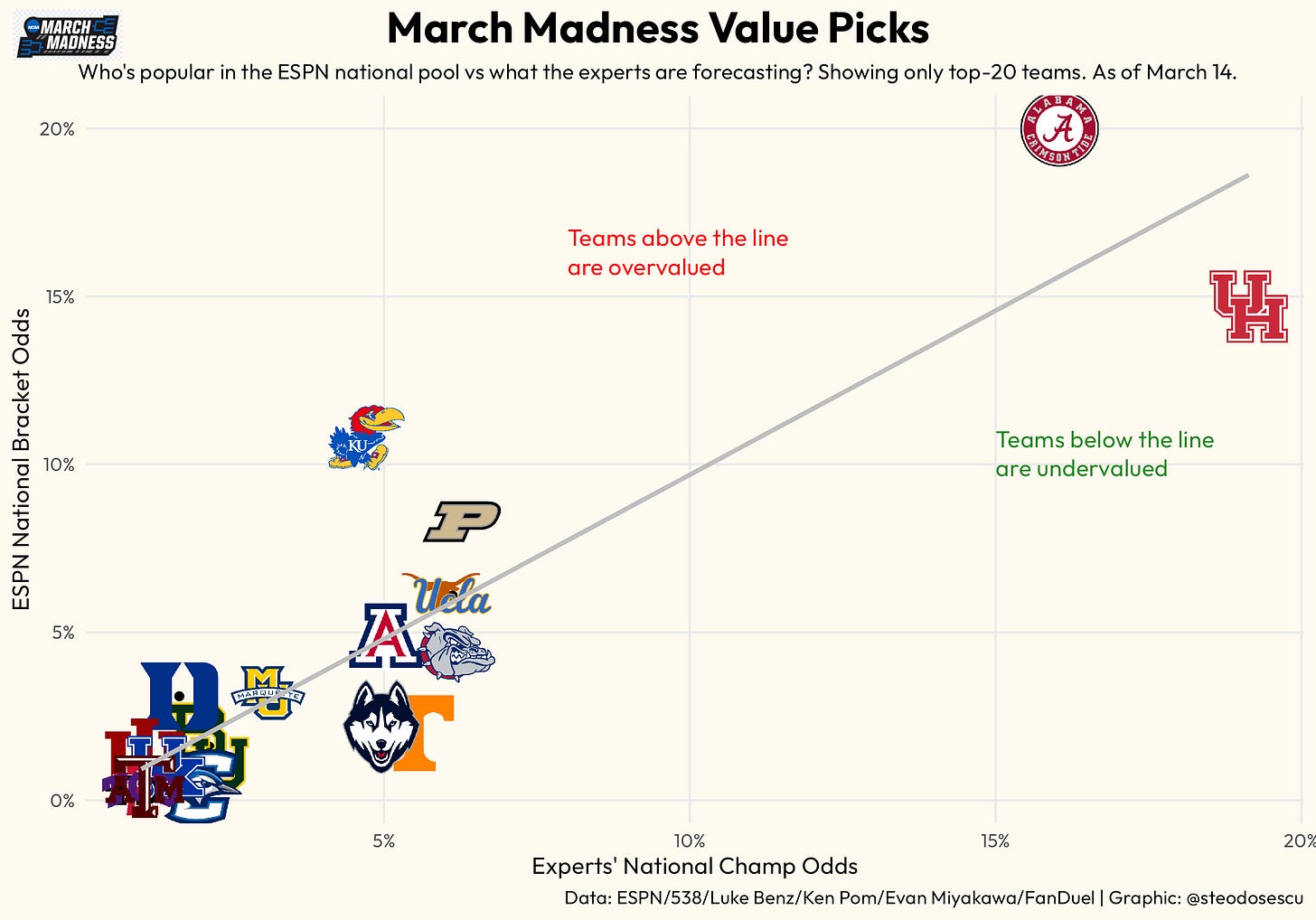Hunting for value in picking March Madness winners
The Big Dance starts this week and BTP picks the winner using its typical data-driven approach
A version of this article ran in 2017, 2018 and 2022.
The best month of year is upon us. Amateur bracketologists and expert pundits alike will be focusing on one thing for the next few weeks: March Madness.
And now that the brackets are out and the start of the tournament is imminent we can all debate the worthiness of each teams’ seeds, most likely Cinderella picks, and of course, who we think will win the National Championship three weeks from now.
I have a simple philosophy when it comes to trying to win my inter-office bracket pool, and I encourage you — dear reader — to use it too:
Look for value against the public in picking early round games
Keep your Final Four intact (by eschewing tempting Cinderella stories and picking only higher seeds)
Make a “contrarian” pick to win it all
The Wall Street Journal’s Andrew Beaton and Ben Cohen write a version of that recommended approach every year. Their latest advice is to “Study the data. Look for value. Find the best, least popular team. Make it your pick to win the national title.”
A lot of the decision of who to pick to win it all is driven by the size of your tournament pool. You may pick a different champion in a 1000-plus person pool vs your smaller 30-person pool at the office. The goal is to have a unique enough bracket that gives you the best chance to be the sole winner when the confetti flies on April 3rd.
So who’s gonna be taking college hoops’ ultimate prize home in the 2023 NCAA Tournament, according to the The Data?
My pick is the Houston Cougars. Now I realize this isn’t exactly a contrarian pick seeing as Houston is the top rated team in the land by many advanced metrics sites; but more on that later.
Ken Pomeroy’s kenpom.com (the Bible of college basketball analytics) has the Cougars as the No. 1 team with an Adjusted Efficiency Margin (AdjEM)1 of 28.82 points. That means on a neutral court (like the NCAA Tournament) the Cougs would be expected to score nearly 29 more points than an average NCAA team over the course of 100 possessions.
Houston is second behind only Alabama, according to Sports Reference’s measure of team strength know as Simple Ratings System (SRS)2. Houston has the best rated defense in the nation according to Sports Reference's Defensive Rating metric to go along with a top-10 offense. Gonzaga, another interesting consideration, has the best Offensive Rating at 121.4.
A team from the non-big six conferences (ACC, Big Ten, Big 12, SEC, Big East and PAC 12) hasn’t won a national title since UNLV did it in 1990. But notably, Houston — currently in the American Athletic Conference — will make the move to the Big 12 next year, and have played to the level of teams in those better conferences for years now.
The Cougars have made the most of their final season in the weaker AAC, earning a fourth regular-season conference title in the past five seasons and achieved 31-win campaign this year. They’ve held the top spot in the AP Poll each of the past three weeks entering the tournament as well.
Like I said earlier, you want to pick a team that represents a good value, and that’s exactly what Houston is even if this isn’t the most outside-the-box pick.
Since the tournament expanded to 64 teams in 1985 No. 1 seeds have won 24 national championships (out of 37). Compare that with five for the No. 2 seed, four for the No. 3 seed and just one title for the No. 4 seed. The six, seven and eight seeds also have one championship apiece while a No. 5 has not won since the tourney expanded.
Houston isn’t the only value pick this year though. Comparing what the public is picking in the ESPN Tournament Challenge vs what an ensemble of experts3 are choosing, Tennessee, UConn and Gonzaga join the Cougars as the teams who are undervalued by most brackets but have a legitimate shot at winning the national title. In fact, in a large pool I would likely pick UConn to win it all. The Huskies represent 2.8 points of value over what the crowds are picking, and have been an under-the-radar good team all season.
Here’s a look at the top 20 teams most likely to win ranked by their SRS. It becomes obvious you'd be wise to stay away from Alabama4 as well as blue bloods such as Kansas, Duke and even Purdue. Hunt for value in top seeds that are being underrated by the general public.
According to Beaton and Cohen at the WSJ, “…you want to think of your bracket as an index fund that mirrors the stock market, and you want to anoint a national champion as if you were running a hedge fund. Getting the national champion right is good. But getting the national champion right when almost everyone else in your pool is wrong is alpha.”
Well said. Seek alpha, and win your bracket5.
Good luck.
AdjEM is the difference between a team's offensive and defensive efficiency ratings, and represents the number of points a team would be expected to outscore the average Division I team over 100 possessions.
SRS is a rating that takes into account average point differential and strength of schedule for each team. It’s denominated in points above/below average where zero is average. Non Division I games are excluded from the calculation.
I averaged the simulated predictions of Luke Benz, fivethirtyeight.com, Evan Miyakawa, and FanDuel’s odds.
If for no other reason than your own morals.





